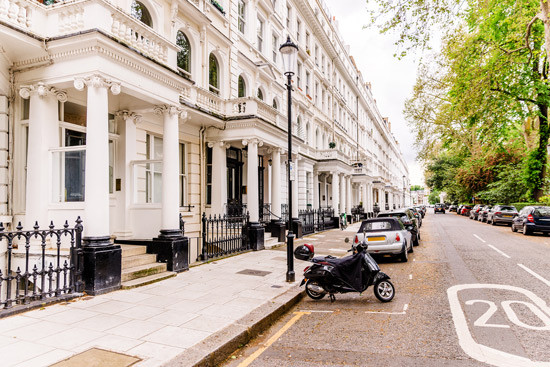Blog
We keep you up to date on the latest tax changes and news in the industry.
UK’s Non-Dom Tax Shake-Up: Could Wealthy Americans Flee?

Per the BBC, the UK government is reconsidering the Labour Party’s proposed changes to the non-domicile ("non-dom") tax status amid concerns that the reforms may not generate as much revenue as initially anticipated. Originally designed to raise an additional £1 billion to fund public services like the NHS and school breakfast programs, the changes are now being reviewed over fears that they could prompt wealthy non-doms to leave the UK, taking their tax revenue with them.
Entrepreneur Bassim Haidar – a Nigerian by birth – told The Guardian earlier this year that he has decided to relocate to Monaco and Dubai, lured by their tax-free status. He, among others, anticipated substantial financial repercussions if he and his family remained in London, estimating millions in additional taxes annually.
Haidar spearheaded a group of 29 individuals planning to exit the UK, despite loving the London lifestyle. Haidar told Guardian reporters, “We love London, we love the lifestyle. We love everything about it, and we’re gutted that we have to go, but we have to think of our future, and the future of our children. With such a punitive tax system [now in the UK], for the protection of their future wealth it makes a lot of sense for them to leave and for us to leave.”
As government officials revisit non-dom rules, it could potentially prompt Haidar and others – including some wealthy Americans – to remain in the United Kingdom.
What is the Non-Dom Tax Status?
The non-dom tax status allows individuals who live in the UK but consider their permanent home to be outside the country to pay tax only on UK-sourced income and gains, or foreign income and gains if they are brought into the UK. This means that, under the current rules, individuals can live in the UK and still avoid paying tax on much of their global wealth, as long as it stays outside the country.
For Americans living in the UK, this has provided a crucial way to minimize their tax burden, especially considering the complicated tax obligations they already face from the IRS under U.S. citizenship-based taxation.
What Changes Have Been Proposed?
Labour's plan, which was set in motion by the previous Conservative government, calls for the complete phasing out of non-dom tax status. The original goal was to collect additional tax revenue that could be used to support public services, including funding for hospitals and schools. However, Treasury officials now worry that scrapping the regime could backfire.
As previously noted, wealthy individuals may simply choose to relocate to more tax-friendly jurisdictions, such as Switzerland or the aforementioned Monaco and Dubai. This mass exodus could offset any projected tax revenue gains, leaving the government short of its £1 billion target.
In a September 27 report, Reuters shared that the Office for Budget Responsibility, the nation's fiscal watchdog, is expected to certify the costings of all measures during an October 30 budget announcement.
"We are committed to addressing unfairness in the tax system so we can raise the revenue to rebuild our public services. That is why we are removing the outdated non-dom tax regime and replacing it with a new internationally competitive residence-based regime focused on attracting the best talent and investment to the UK," a spokesperson told the outlet.
Potential Impact on Americans Living in the UK
For the many Americans who reside in the UK, the potential changes to the non-dom regime are highly significant. There are several ways in which U.S. citizens could be directly affected:
Increased Tax Exposure:
Americans living in the UK who currently claim non-dom status could face notably higher taxes if the rules are changed. The existing benefits of keeping foreign income and gains out of UK tax jurisdiction would disappear, leaving them exposed to UK taxes on their global income. Since U.S. citizens are taxed on worldwide income by the IRS, they could face double taxation, with far fewer options to mitigate it.Emigration Concerns:
The fear of double taxation may lead many wealthy Americans to consider leaving the UK. Former UK chancellor Nadhim Zahawi mentioned that in July alone, 5,000 British citizens applied for residency in tax havens like Monaco. American non-doms could follow suit, seeking out more favorable tax jurisdictions. However, for U.S. citizens, relocating to a tax haven wouldn’t relieve them of their IRS obligations, adding another layer to their decision.Tax Planning Disruptions:
Many Americans in the UK who have structured their investments, trusts, and estates around the non-dom system could face significant financial disruption. The elimination of non-dom status would require Americans to rethink their long-term financial planning and seek advice on how to restructure their assets in a way that minimizes their UK tax liability without running afoul of existing U.S. tax laws and IRS regulations.

Prominent Americans Who May be Affected
Numerous high-profile Americans currently residing in the UK could see significant tax consequences if the non-dom rule changes take effect. While specific names of U.S. citizens are often kept private due to confidentiality, it's clear that many U.S. nationals involved in finance, business, and entertainment stand to lose significant sums of money if these reforms are enacted.
For instance:
Meghan Markle and Prince Harry, who are dual U.S.-UK taxpayers, could face higher taxes on their investments and income streams that are sourced outside the UK. It is worth noting, however, that the duo primarily makes their home in California, so may not be eligible for non-dom tax rules. However, they are representative of the type of person who could be affected by taxation changes in the United Kingdom.
Robert Tchenguiz, a property tycoon and entrepreneur with U.S. citizenship, has been a long-time resident of London but maintains significant global business interests. His ability to avoid UK taxes on foreign income and capital gains through non-dom status has likely played a role in his financial planning. Changes to non-dom rules could have substantial tax consequences for someone like Tchenguiz, prompting relocation or restructuring of assets.
Reid Hoffman, the co-founder of LinkedIn, has deep connections to the UK through investments and philanthropic activities. While Hoffman primarily resides in the U.S., he has been known to spend time in the UK, and any significant business interests or financial engagements within the country could make him eligible for non-dom status. Changes to the rules could force him to reconsider how he manages his assets or business dealings in the UK.
Nimesh Shah, CEO of the tax advisory firm Blick Rothenberg, has noted that many non-doms have already begun leaving the UK in response to the proposed changes, and more could follow in the coming months if alterations are not made to the initial proposal.

Diego Cuevas/Getty Images Entertainment via Getty Images
How Could These Changes Affect Tax Revenues?
The UK Treasury's concern that these massive tax changes might ultimately bring in less money than anticipated is rooted in the idea of behavioral changes. Wealthy individuals, particularly non-doms, have the financial means and mobility to relocate quickly, as seen in the increasing interest in residency programs in tax havens like Monaco and Switzerland.
The Office for Budget Responsibility (OBR) has flagged the projected revenue from non-dom reform as "highly uncertain." Since many non-doms "opt-in and out" of the system on a year-by-year basis, it’s challenging to accurately predict how many would ultimately stay in the UK under the new rules and how many would leave.
What Should Americans in the UK Do?
For Americans currently living in the UK or considering moving there, it’s important to stay informed about this ongoing issue. Consulting with tax advisors who specialize in both domestic and international tax law will be crucial for navigating any changes that are ultimately made to the non-dom system. Strategies such as preemptive emigration or restructuring financial holdings may become necessary.
While it remains uncertain exactly how these changes will be implemented, it’s clear that they could have a far-reaching impact on the wealth and tax planning of Americans residing in the UK.
Want our best tax and accounting tips and insights delivered to your inbox?
Sign up for our newsletter.